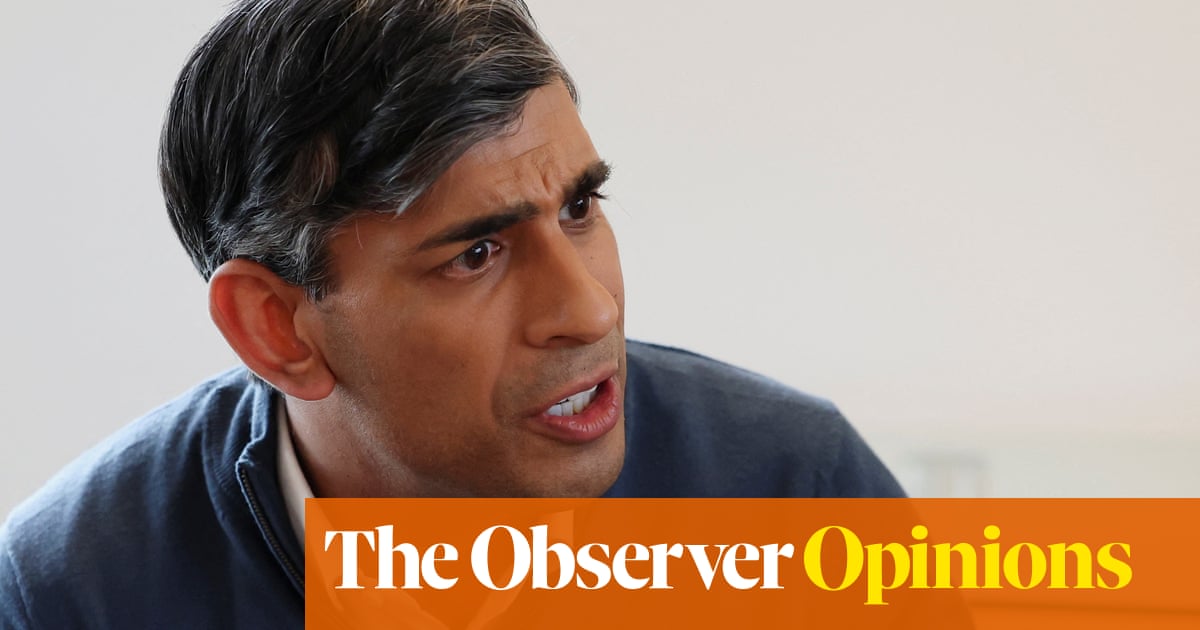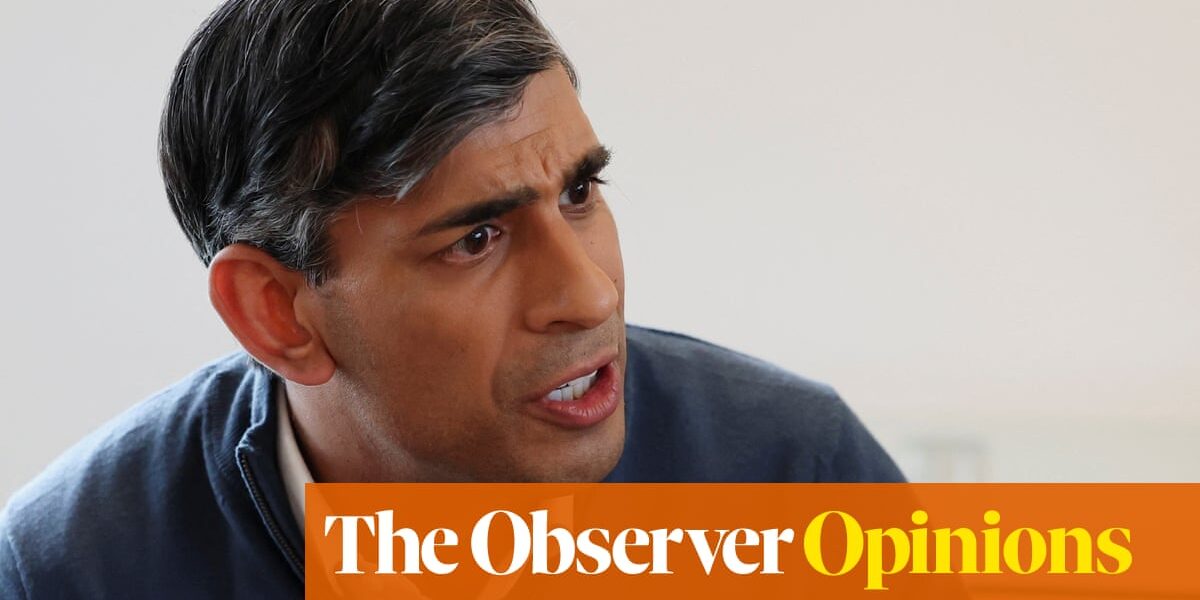In all this noisy election debate, why is there a conspiracy of silence about Brexit? | Andrew Rawnsley

It is not so much the elephant in the room as the big fat hairy mammoth. Brexit is the most consequential thing the Conservatives have done since the last election. More, it is the most impactful legacy of their 14-year stretch in power. When the histories are written, every other failure of this Tory era will be a footnote compared with that epic folly.
With Partygate and all the other scandals on his watch, Boris Johnson recklessly tested Britain’s tolerance for being governed by a prime minster who flagrantly debased standards in public life. With the maxi-disaster of her mini-budget, Liz Truss conducted a deranged experiment that exploded not just in her face, but blew the doors off the country. Ruinous to the Tory party’s reputation as those episodes were, nothing has left a wound as deep, gaping and untreated as that inflicted by Brexit. Yet there’s a conspiracy of silence about it from both the Tory leader and his Labour rival. It did not feature once, not even as an aside, in last week’s 60 minutes of televised mouth-to-mouth combat between the two. Rishi Sunak, who advocated Brexit, doesn’t want to talk about it for the obvious reason that none of the promises which accompanied that enterprise – “a new golden age” anyone? – has come true. He will also be aware that most voters have concluded it has been such a calamity for the UK that we ought never to have torn ourselves apart from the EU.
Reform, the reheated Brexit party, doesn’t seem keen on the subject either. Since Nigel Farage played such an outsize role in making it happen, he ought to be made to answer for its consequences, but wasn’t obliged to do so during Friday night’s multiparty debate.
Given the odds that Labour will form the next government, it would be useful to know how exactly it plans to set about trying to salve the pain inflicted by Brexit. The party has vague phrases about sanding off some of the rougher edges of the departure deal, along with warm words about seeking a better relationship with our neighbours. But Sir Keir Starmer, though an ardent Remainer back in the day, is unlikely to say anything more substantial before he’s inside Number 10.
Labour seeks the support of people who backed “out”, especially in working-class areas of the Midlands and northern England, and the party’s pollsters have cautioned the Labour leader that these voters really don’t want to be made to think about Brexit. Sir Keir is leery of riling them by starting a conversation that makes these folk feel uncomfortable.
No one without access to a time machine can tell us what presently unforeseen crises will land in the lap of the next occupant of Number 10. But you don’t need to be Doctor Who to know that there’s a climate crisis that is increasing in severity and that a platter of chewy choices will be on the menu for the next government if net zero is going to be achieved to deadline. About this, as with so many other topics, the Tories are simply not interested in having a serious discussion. All they want to do is scaremonger about Labour compelling people to pay shedloads to install a heat pump. Labour is promoting its plan to create a state-owned clean power company, which it sells as a boost for jobs and energy security. What Labour isn’t interested in, for fear of exposing its shins to a kicking from its enemies on the right, is engaging the electorate in a wider conversation about the tougher decisions that will be necessary to get to a sustainable future.
This is not my first rodeo. I know it sounds naive to complain about politicians being reluctant to talk about sticky choices and tricky trade-offs during an election. A grown-up conversation about the biggest challenges facing Britain is especially unlikely to happen during a campaign in which Labour sees no incentive to take any chances with its apparently enormous advantage and the Tories are limping so far behind in the polls that they are terrified of shedding what shrivelled support they have left. These questions, nevertheless, demand our attention because the dilemmas that are being ducked during the campaign aren’t going to be avoidable by the next government.
A third tusky pachyderm pacing about the room is how Britain is going to repair its decayed public services when the national finances are fragile. Although the creaking state of the NHS, schools, courts, prisons and other key elements of the public realm are supposed to be central to this election, we are not going to have a full and frank conversation about how to revive them because this would entail having an adult discourse about taxation.
We are instead witnesses to the wearily familiar and reliably ridiculous game of “tax bombshells” and “dodgy dossiers” in which each party claims that it is being entirely upfront about its plans, while insisting that the other lot is secretly plotting to pick the pockets of the public. Mr Sunak’s crude tax attack on Labour, one of the last shots in his depleted locker, has blown back on the Tory leader. A scolding letter from the top mandarin at the Treasury exploded as mendacious the claim that the costings had been calculated by “independent civil servants”. That gave Labour a platform to denounce the Tory leader as a liar. Mr Sunak then made the mind-bogglingly stupid decision to cut short his attendance at the D-day commemorations in order to scuttle back to Britain to do a TV interview. This gift to all his opponents has forced humiliating apologies from the prime minister and given yet another reason for Conservative candidates to tear out what remains of their hair about the conduct of the Tory campaign and the judgment of their leader. He turned a week he wanted to be about Labour and tax into a week about him insulting veterans, snubbing world leaders and deserting his duty.
after newsletter promotion
The claims and counterclaims about tax are anyway not impressing a jaded electorate that doesn’t believe any politician on the subject. Only one in four voters trust Labour not to put up major taxes. That’s a pitiful reward for all the effort Sir Keir and Rachel Reeves have put in swearing that they won’t raise the rates of income tax, national insurance or VAT. Before any Tories get excited about that, just one in six people think they can be trusted not to raise major taxes.
The voters are right to treat everyone’s claims with deep suspicion. Read my lips, no one is being candid about tax. It is utterly implausible that a Tory government, in the rather unlikely event that it is returned to power, could keep its promises to reduce tax without inflicting searing pain on critical public services that are already on their knees. It is stretching credulity to snapping point to suggest, as Labour does, that it can significantly improve the public realm without imposing some tax increases that it has yet to reveal.
The debate we deserve is not the puerile one the politicians are having about whose figures are the more fictitious. What we ought to be talking about is how to modernise the tax system to make it more equitable and more helpful to growth. Thanks to the cowardice of successive governments, council tax is long overdue reform. Did you know that Buckingham Palace pays less in the property tax than a family in the average three-bedroom semi in Blackpool? It is hard to disagree with Paul Johnson, the director of the Institute for Fiscal Studies, that this is absurd.
We also need to ask whether it is reasonable that capital gains are taxed much more lightly than earned income, an area that there is reason to think a Labour government will want to look at. Inheritance tax is riddled with exemptions that are lucratively exploited by the very richest. The thinktank Demos recently secured official data showing that a tiny group of the UK’s wealthiest estates were able to shelter nearly £2bn of assets from inheritance tax in the 2020-21 tax year. That would buy you a lot of hospital scanners, operating theatres and A&E suites.
On tax, the discussion we ought to be having is about how to make it simpler, fairer and more efficient. Just as we should be talking about addressing the climate crisis and the best way to shape Britain’s relationship with its continent. Taboo subjects for both the main parties on the campaign trail, these critical debates will be made to wait until we get to the other side of polling day.
Source: theguardian.com



